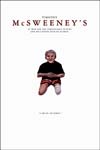Difference between revisions of "McSweeney's"
m (→External Links) |
|||
| (9 intermediate revisions by 2 users not shown) | |||
| Line 1: | Line 1: | ||
[[Image:Mcsweeneys.jpg|frame|McSweeney's Issue #14]] | [[Image:Mcsweeneys.jpg|frame|McSweeney's Issue #14]] | ||
| − | '''McSweeney’s''' began in 1998 as a [[lit zine]] that only published works rejected by other magazines. After one issue, editor Dave Eggers expanded the vision to include the writing of both up-and-coming and established American | + | '''McSweeney’s''' began in 1998 as a [[lit-zine]] that only published works rejected by other magazines. After one issue, editor Dave Eggers expanded the vision to include the writing of both up-and-coming and established American [[writer]]s. It is published on a roughly quarterly schedule, and each issue generally has a new design, look and subject matter. Issues of McSweeny's have looked like traditional zines, perfect bound books, and even boxed collections of [[chapbooks]] and other ephemera. Some of the more notable writers for McSweeney's have included Denis Johnson, William T. Vollmann, Rick Moody, Joyce Carol Oates, Heidi Julavits, Jonathan Lethem, Michael Chabon, Ben Marcus, Susan Straight, Roddy Doyle, T.C. Boyle, Steven Millhauser, Gabe Hudson, Robert Coover, Ann Beattie and Neal Pollack. |
| − | McSweeney’s has grown into a popular and widely-circulated literary journal, and while no longer a zine, still features the writing of | + | McSweeney’s has grown into a popular and widely-circulated literary journal, and while no longer a zine, still features the writing of some former [[zinesters]]. (Zinesters are more likely to appear on its website, which has less strict standards for publication.) It also expanded into other areas, creating six non-profit writing centers in Los Angeles, Valencia, Seattle, New York City, Michigan and Chicago. McSweeney's also runs its own small publishing house, focusing on books from its current and former contributors. The journals themselves are printed in Iceland and cost upwards of $20 each. |
==Zine Controversy== | ==Zine Controversy== | ||
| − | McSweeney's won "Best Zine" in the 2001 Firecracker Alternative Book Awards, sparking off a series of letters and | + | McSweeney's won "Best Zine" in the 2001 Firecracker Alternative Book Awards, sparking off a series of letters and internet posts by the [[Underground Literary Alliance]], which objected to McSweeney's being called a zine when it had by then grown in size, circulation and prominence. [[Michael Jackman]] created the [[one-shot]] [[Wet Firecracker]], explaining the ULA's side of the debate. [[Karl Wenclas]] and other ULA members have continued to openly criticize Eggers and other McSweeney's alumni. Eggers struck back at them in an anonymous Amazon.com customer review of one of Julavits' novels (his identity was revealed by a computer glitch at Amazon). |
==External Links== | ==External Links== | ||
| − | * [http://www.mcsweeneys.net/ Official website | + | * [http://www.mcsweeneys.net/ Official website] |
| − | [[Category:Zine|McSweeney's] | + | [[Category:Zine|McSweeney's]][[Category:Magazine]][[Category:Journal]] [[Category:Literary Zines]][[Category:1990's publications]] |
Latest revision as of 00:56, 4 November 2007
McSweeney’s began in 1998 as a lit-zine that only published works rejected by other magazines. After one issue, editor Dave Eggers expanded the vision to include the writing of both up-and-coming and established American writers. It is published on a roughly quarterly schedule, and each issue generally has a new design, look and subject matter. Issues of McSweeny's have looked like traditional zines, perfect bound books, and even boxed collections of chapbooks and other ephemera. Some of the more notable writers for McSweeney's have included Denis Johnson, William T. Vollmann, Rick Moody, Joyce Carol Oates, Heidi Julavits, Jonathan Lethem, Michael Chabon, Ben Marcus, Susan Straight, Roddy Doyle, T.C. Boyle, Steven Millhauser, Gabe Hudson, Robert Coover, Ann Beattie and Neal Pollack.
McSweeney’s has grown into a popular and widely-circulated literary journal, and while no longer a zine, still features the writing of some former zinesters. (Zinesters are more likely to appear on its website, which has less strict standards for publication.) It also expanded into other areas, creating six non-profit writing centers in Los Angeles, Valencia, Seattle, New York City, Michigan and Chicago. McSweeney's also runs its own small publishing house, focusing on books from its current and former contributors. The journals themselves are printed in Iceland and cost upwards of $20 each.
Zine Controversy
McSweeney's won "Best Zine" in the 2001 Firecracker Alternative Book Awards, sparking off a series of letters and internet posts by the Underground Literary Alliance, which objected to McSweeney's being called a zine when it had by then grown in size, circulation and prominence. Michael Jackman created the one-shot Wet Firecracker, explaining the ULA's side of the debate. Karl Wenclas and other ULA members have continued to openly criticize Eggers and other McSweeney's alumni. Eggers struck back at them in an anonymous Amazon.com customer review of one of Julavits' novels (his identity was revealed by a computer glitch at Amazon).
